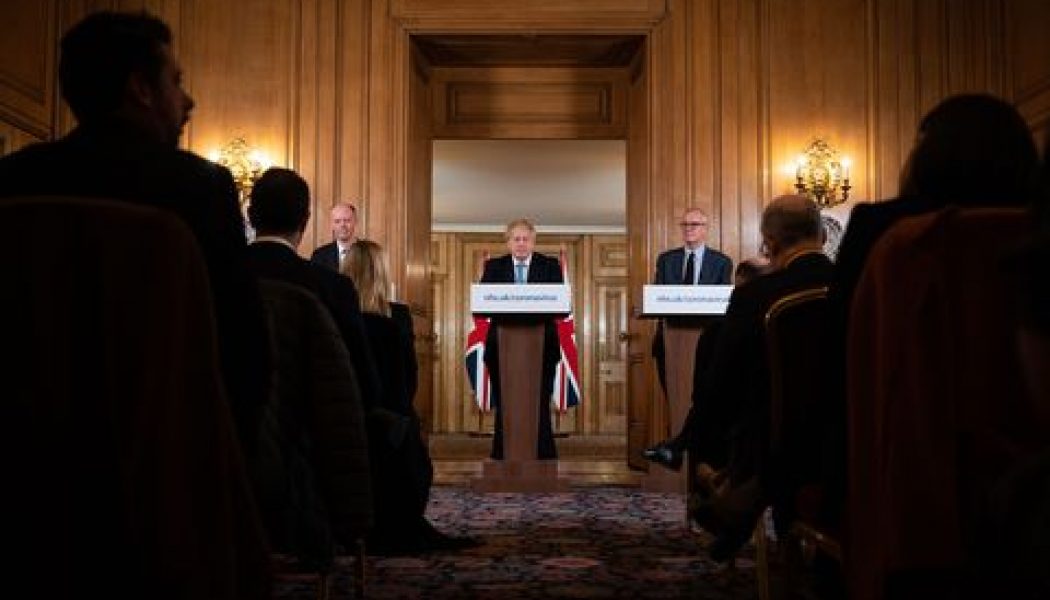We are in lockdown.
Supermarket shelves are stripped bare. Flights are grounded. Workers have been laid off; furloughed; transformed into primary school teachers. A Conservative government has nationalised the railways and is paying people not to work. And this is still only week two. In less than a fortnight, Britain has experienced the kind of social and political upheaval that normally only comes when you guillotine some royals, or storm a winter palace. But is this a brief moment of national solidarity, or a ‘new normal’?
That all depends on how long the coronavirus crisis lasts. Experts believe a vaccine for Covid-19 (the disease caused by the Sars-CoV-2 virus) is still at least 18 months away, which makes Donald Trump’s promises that the US will “reopen” in three weeks seem optimistic at best. In the UK, the more likely reality was laid out in a report by researchers at Imperial College London, which estimated that elements of the new normal – social distancing, self-isolation, rolling lockdowns – could last until September 2021. So what’s likely to happen as the coronavirus crisis continues?
The reality is, nobody knows. We have never faced something like Covid-19 before and though there are analogues in the way that countries adapt to traumas like war and famine, in the global west at least, this situation is unprecedented in the modern age. Already, the impact of the coronavirus crisis on everything from the economy to social interactions to the environment has been enormous. So we asked the experts what they think’s going to happen as the pandemic bites, then finally abates.
Month One: Infection
One thing is close to certain: things will get worse before they get better. “I think the epidemic will certainly continue for the next three months,” says Dr Paul Hunter, professor of medicine at the University of East Anglia. He believes that restrictions on movement will only get more severe over the next 30 days. With no one commuting, city centres will be deserted. Building sites will go quiet and shops, bars, restaurants and pubs will remain shuttered.
In their absence, supermarkets and grocery delivery companies will thrive: according to data insights consultant Kantar, which tracks more than 100,000 British shoppers, we made an additional 15 million supermarket visits in the week ending 17 March (the first week of social distancing), compared to the same week in February. The average spend was up, too, climbing 16 per cent. Despite what the pasta wastelands might imply, that’s not just people stockpiling.
“Supermarkets actually account for only about 60 per cent of the food we [normally] consume,” says Tim Lang, professor of food policy at City University, London. The rest comes from your Friday fish and chips, your Saturday brunch, and all those al desko Pret lunches (oh, falafel flatbread, how we miss thee). “If 40 per cent [of the food supply] is cut off, and 60 per cent has to deal with 100 per cent, well, you’ve got stress and strains. It’s inevitable.”
Though you shouldn’t expect to see shelves overflowing, they will get less barren as people acclimatise and work their way through the cupboards they’ve filled in preparation for self-isolation. But the real problem for most people won’t be what’s available – it will be paying for it. “People in a month or two’s time will struggle to make their rent and pay their grocery delivery bill,” says Lynette Nusbacher, a former government adviser who now acts as a strategist for major companies. The hardest hit will be gig economy workers, who rely on us zipping around in Ubers after a few too many down the pub, especially since they’re technically self-employed contractors and so less protected by the government’s salary support programmes.
April is also when the NHS will hit its first big pinch point. All the indications show we are on track to follow Italy’s path in the spread of disease, where the death toll has already crossed 6,000 (at the time of writing, there have been 355 coronavirus-related deaths in the UK). The UK has 2.8 physicians per 1,000 people – lower than Spain and Italy, which have 4.1 doctors per 1,000 patients. The number of patients who need critical care will increase dramatically and the NHS is likely to be overwhelmed. As is already happening in Spain and Italy, medical staff will be forced to choose who receives the limited resources, with ventilators being removed from the elderly and given to the young. “We’re used to the idea of waiting lists for healthcare,” says Nusbacher. “But the idea you’d be told, ‘Sorry, we’re not going to hospitalise your grandad, take him home and make him comfortable’, is going to hit us at a very visceral level.”
Month Three: Recession
The hope is that, by July, we’ll have hit a first key milestone: after months of day-on-day increases in new coronavirus cases and deaths, rates for both should start to slow. “I suspect until we see that, we won’t be starting to relax any distancing rules,” says Hunter, although he’d be surprised if lockdown hadn’t been lifted at this point. “Hopefully it’ll happen before the end of May, but it might not.”
Whether Trump’s promise to restart the US economy within a month comes to fruition, it seems likely that three months from now, a number of countries will have begun to return to at least some semblance of normality. “It is most likely, according to our experts, that we’re going to see the ability of people to go out and operate economically in July or August,” says Nusbacher. “It could possibly be a little bit sooner.”
Expect the economy to follow what’s happening in hospitals. “It’s going to be grim, but I personally think things will relax as we move into summer,” says Hunter. “I don’t know it for certain, but I suspect the disease will decline quite steeply towards the end of June. In part that will be because of the measures the government have implemented and encouraged, but also in part it’ll be because of the fact that it’s summer and things will be getting a bit easier.” As things warm up we’ll be allowed to spend time in parks again, but expect some forms of social distancing to still be in place to prevent a second spike in infection rates.
Distance will be the norm at work, too. “I think business travel will go and it will be only when people need to be there: when you need people working in the oil and gas industry to go out and do some work on the rigs in the Gulf,” says Cary Cooper, professor of organisational psychology at Manchester Business School. Our travel-shyness won’t just be because we’ll see the aviation industry (or whatever form of it survives a three-month shutdown) as a vector for spreading coronavirus around the world. It’s also because, after being ordered to work from home, people will realise how much of what normally happens face-to-face can be replaced by technology.
That’ll feed down to rank-and-file workers in the service economy, too. Two years ago, Cooper undertook a study asking about how and why people do or don’t take advantage of the legal right to ask for flexible working from their employer. They found that while women took the option, men didn’t, for fear that it would adversely affect their career. “There was an inhibition, but now there is no inhibition,” Cooper says. “At the moment you’re being forced to work exclusively from home.”
Back in the bricks-and-mortar world, supermarket stocks will stabilise around fewer lines, as manufacturers prioritise getting what they can onto shelves. Our relationship with food will change, too. “We need to be thinking very carefully about renationalising supply chains, out of resilience preparedness,” says Lang, the food policy expert. “We’ve developed, over 60 years, a culture that says, ‘I can eat what I like, when I like, and it’ll be cheap forever, and I’ll overeat as well.’ That culture has got to change.” Tropical fruits will disappear from shelves and seasonal fruits will become so again, thanks to hold-ups at borders due to decreased freight flights. That means no more strawberries in winter. “Coronavirus is going to take a scythe through the normality of food.”
The return to social normality, however, is likely to spark a new round of infections. “In places where we start the economy too soon and let people go to their jobs and let normalcy return in some fashion, it looks like there’ll be a brisk and deadly outbreak,” says Nusbacher. “Brisk because when people are back into contact, there will be infections, and deadly because the capacity of any health setup to administer intensive care will be overcome.”
This could be the moment the British high street dies, believes Nusbacher. Coronavirus won’t be the underlying cause, but it will usher in the age of on-demand delivery and centralised warehouses sooner than might have happened organically. As Amazon and friends eat up even more market share, the impact on everyone else will be enormous. Nearly three million people are employed in the retail sector and although some of them will end up working as pickers for online deliveries, automation means a large proportion of those jobs will cease to exist. “A lot of people will be left out,” says Nusbacher.
Month Six: Relapse
By September, we’ll start reckoning with the lasting effects of Chancellor Rishi Sunak’s coronavirus budgets. Those who can will return to their workplaces. Those who have been laid off – or who were furloughed from companies that then went bust – will struggle to figure out what comes next. With the US economy currently contracting at the fastest rate since the financial crisis, another six months of coronavirus lockdowns all but guarantee a global recession, as economies reel from unprecedented collapses in both supply and demand. Those jobs that disappeared during the crisis are unlikely to return, which could lead to a spike in unemployment. The answer could be a more generous safety net.
“We are going to be spending half a year socialising people to the idea that, when there is a social necessity, it is not a moral hazard to pay people without expecting work in return,” says Nusbacher. “This is an ethical change.” A universal basic income, which has been trialled in Finland and Canada to mixed results, could demolish the working class. Instead of their value to the economy being calculated by how much they produce, it would be based on their consumption – the way in which they spend the money given to them by the government.
For those whose jobs survived, the way they work will change. Offices will shrink and become places to pop into a couple of times a week for a catch-up, rather than somewhere to spend 40 hours sat in front of a computer (you can do that at home, after all). “We’re going to need a new ‘manager’,” says Cooper. “Somebody with very good social skills to manage virtual teams.” The changes in how our economy functions will accelerate that shift, as we rely less on shared resources like printers and speedy internet. “The only thing that stopped people doing it [before coronavirus] was the fear that it gave off the impression you weren’t committed.”
Beneath the veneer of normality, however, the virus will be lurking. As summer fades, we’ll see a resurgence in the number of cases that require careful management. Rolling lockdowns will be enforced in different areas of the UK to reduce demand on NHS critical care beds. In turn, that means we’ll need to create some slack in the health system. “Next Christmas or so, I bet we see quite a marked increase in the birth rate,” says Hunter. “You can only watch so many back episodes of Dad’s Army and Carry On films before you get bored with the telly.”
Especially since there’ll be less new stuff to watch. With cinemas likely to stay shut for the foreseeable, studios will have to decide whether to delay films indefinitely, or make them available for streaming instead and take a bath on the box office numbers. Social distancing and travel bans will shut down production on films and TV shows, too, which will force broadcasters and studios to either dig through their archives or figure out new ways to create content.
Schools will return, and universities too, but with fewer international students as people put their lives on pause, or carefully consider whether they want to be halfway around the world when another outbreak arrives. Just as office workers will question whether they really need to all be in the same room to do their work, so we’ll see secondary schools and universities start to consider whether the emergency methods they’ve put in place over the last few months can become more permanent.
Month Twelve: Resilience
With the novel coronavirus no longer so novel, the way we deal with suspected cases will have changed radically. Though a vaccine is still unlikely at this point, medical staff will have become accustomed to dealing with Covid-19 and its associated complications, so will have a better set of treatment options. “Medicine is a science,” says Hunter. “Everything we do is supposed to be driven by hard evidence, but often there’s a lot of what goes on in medicine that can’t actually be controlled for in trials. It’s the individual doctors and nurses who can spot when things need to be done better, because they’ve seen it 50 times already and they get more tuned into what the signs are that they need to be getting worried.”
The way the government traces the virus’s spread could also change. “You might then decide whether you’re going to put a lot of effort into identifying cases that crop up and isolating them – the sort of thing we were doing in late January and early February 2020,” says Hunter. “But that’s quite a long way down the line.”
One possible bright spot is that, with industry and travel essentially paused, our carbon emissions will collapse. Researchers have already seen massive drops in the release of nitrogen dioxide, with parts of China showing pollution levels up to 30 per cent lower than normal. In northern Italy, nitrogen dioxide levels have fallen by as much as 40 per cent. Though this alone isn’t enough to stave off the climate crisis, the shift in behaviour precipitated by the coronavirus pandemic is, perhaps, a sign that we can all make huge personal sacrifices when faced with a global, existential threat. That, at least, is a positive sign.
However, everything else will be much less rosy. We’ll likely still be in recession and whole sectors of the economy will be fundamentally reshaped. “We might see professional services organisations finding it difficult to say: ‘Everybody come to work’,” says Nusbacher. “We might see the wreckage of some companies that can’t be profitable, just as business models are put under stress right now.” Europe, in particular, may think twice before restarting its hydrocarbon-based economy, and instead take the chance to think greener.
The coronavirus won’t have caused it, but it will be the rocket fuel for changes that have been long coming. “I’m not saying this one pandemic is going to cause permanent social change,” says Nusbacher. “I’m saying this pandemic could be the factor that pushes this lever. The fulcrum is the longstanding set of changes. There’ll be an attempt to return back to normalcy, but that won’t work. Time has moved on. There was going to be social and economic change anyway, and any attempt to ignore that will run up against economic reality.”
But there will be one bright light at the end of the tunnel – a vaccine.
Month Eighteen: Recovery
As a disease, coronavirus is here to stay. But the vaccine – and a carefully considered delivery – will alleviate its impact. “I suspect what will happen is that when a vaccine becomes available, it will be available to those groups most at risk and initially healthcare workers who haven’t had the infection,” says Hunter.
The rest of us will be strong enough to withstand the virus, or will already have had it. “By the end of 2021, there will be some effective treatment,” says Nusbacher. “By the middle of 2021, a lot of people will have immunity due to exposure and survival. That will make a difference. The pandemic will be over and we’ll be dealing with what happened in the past, rather than what happens now.”.
There could be seismic shifts in the world order. China will be keen to restart its economic growth. Countries that benefited from Chinese medical aid, like Italy, will forge closer ties with Beijing. America will, perhaps, finally reconsider the effectiveness of a market-based healthcare system. And in the UK, in the wake of the Conservative government ripping up a century of dogma to save the economy, we may see significant shifts. Just-in-time delivery infrastructure could become a thing of the past and maximum efficiency in the NHS may be seen as a problem, rather than a goal.
Countries – and people – are resilient. Coronavirus will bring about a revolution in the way that Britain lives and works, but many of the long-term shifts it ushers in would likely have occurred anyway, even if not quite this quickly. The test for our society is how we look after those who lose out once society reorders itself. Whether the sense of shared responsibility for the most vulnerable, which emerged when the pandemic first took hold, continues once it abates. And whether we will sacrifice our own opportunities in order to protect those whose opportunities are being taken away.
The information in this story is accurate as of the publication date. While we are attempting to keep our content as up-to-date as possible, the situation surrounding the coronavirus pandemic continues to develop rapidly, so it’s possible that some information and recommendations may have changed since publishing. For any concerns and latest advice, visit the World Health Organisation. If you’re in the UK, the National Health Service can also provide useful information and support, while US users can contact the Center for Disease Control and Prevention.
For more advice, visit the following recommended websites:
Like this article? Sign up to our newsletter to get more delivered straight to your inbox













